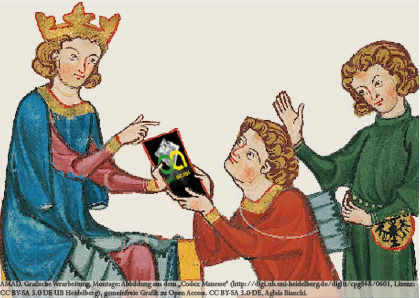AMAD
"Archivum Medii Aevi Digitale - Specialized open access repository for research in the middle ages"To submission

| Date: | 2013 |
| Title: | Citizenship in Later Medieval France, c. 1370 - c. 1480 |
| Contributor: | Collins, James B. |
| Author: | Lurie, Guy |
| Description: | Ph.D. ; Did citizenship exist in later medieval France? The current historical narrative on the history of citizenship would answer no. According to this narrative, many towns north of the Alps saw civic practices, but they were unconnected to fully developed civic ideologies in the Classical Republican tradition practiced in the northern Italian city-republics. As for the late medieval French kingdom in general, the same narrative does not consider citizenship even a relevant conceptual category. ; In my dissertation I examine the interconnections among political thought, political society and the practice of citizenship in the law and politics of France from c. 1370 to c. 1480. I address a number of questions that most historians thus far have not seriously considered, partly because civic discourse and civic practices seem irrelevant to the traditional scholarship and its concern with the rise and sacralization of royal authority. Historians focused on the imminent rise of the modern French state, as well as historians who associate citizenship primarily with the rise of authoritarian city-states in Renaissance Italy, tend not to ask the questions that I address: Who were citizens and who were not? Was citizenship universal in any way? What functions did citizens fulfill and whom did society consider good citizens? What grades of citizens existed and just how unequal was citizenship at the time? My sources include political theory tracts, legal writings, legal proceedings and decisions, edicts, political speeches, chronicles, administrative documents (such as letters of naturalization), and municipal deliberations of several towns. ; Granted, citizenship in later medieval France did not revolve around the modern organizing concept of the democratic liberal state. Yet citizenship as a concept was relevant, and contemporaries held clear conceptions of it. They practiced citizenship in what they considered the commonwealth of the whole realm of France, in the Church, in the commonwealths of the towns (each a self-ruling polity), and in the principalities or regions (pays). In my dissertation I show their conceptions and practices of citizenship not only in the realm as a whole, but also in the towns of Champagne, in Brittany and in Dauphiné. |
| URI: | https://www.amad.org/jspui/handle/123456789/60580 |
| Other Identifier: | http://hdl.handle.net/10822/558320 |
| AMAD ID: | 569093 |
| Appears in Collections: | BASE (Bielefeld Academic Search Engine) General history of Europe |

